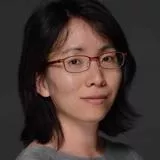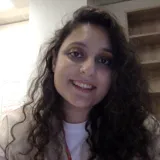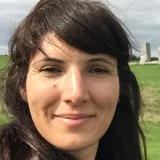[I] hesitated to get [a] COVID test because [I] was living with undocumented people and didn't want someone coming here to investigate.”
Migrant Domestic Worker participating in participatory threat modelling workshop
21 April 2023
Diverse community of researchers celebrated at annual Women in Informatics Conference
Researchers presented their work on subjects from data security of migrant workers to evaluating spatial abilities in mathematics and the arts.
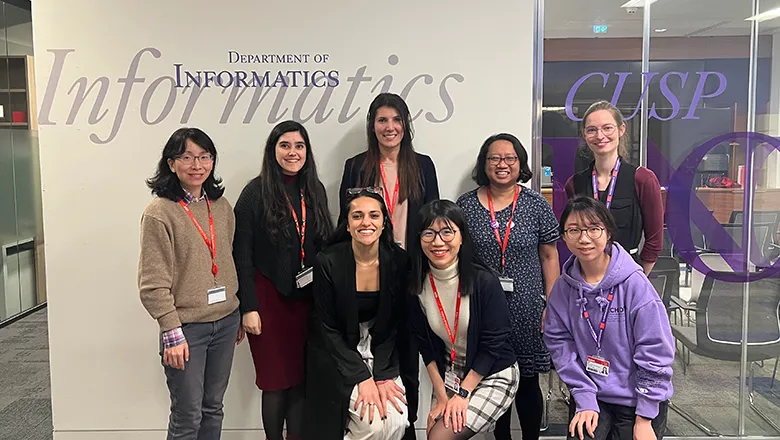
Last month the Women in Science at Informatics group held the annual King’s Women in Informatics Conference, shining a light on the research conducted by students and staff who identify as women or non-binary.
Part of a wider series of seminars and networking opportunities, the Women in Science at Informatics group works to challenge the inequities faced by women in the field throughout their academics careers. Their programme forms a vital building block of the Faculty of Natural, Mathematical & Engineering Sciences' Women in Science initiative.
Convened at Bush House, the conference provided a forum for researchers Yulan He, Ruba Abu-Salma, Jie Zhang, Sara Tandon and Seray Ibrahim to discuss findings from their latest work and their careers in academia, including AI's ability to understand human language, the data security of migrant workers and evaluating spatial abilities in mathematics and the arts.

Yulan He's presentation, Machine Reasoning for Natural Language Understanding, posited what the necessary advancements in AI reasoning would be to enable AI models to understand human languages.
Outlining the current state of machine reason, she explored how her team had incorporated commonsense knowledge, semantic reasoning and evidence reasoning into the natural language models that they built, and the use of novel methodologies to make these more effective. With help from ‘Friends’ Ross and Rachel, she demonstrated that despite challenges, good progress was being made in impactful areas – such as fact-checking AI and language processing.
Ruba Abu-Salma's work looked at the precarious place of migrant domestic workers in the UK amidst its ‘hostile environment’ policies, and how the digital security needs of this marginalised group have historically been ignored - with serious consequences.
Through a series of five PTMs (participatory threat modelling workshops) with migrant domestic workers, Ruba’s team uncovered what the group of thirty-two participants thought were the biggest digital threats to security. Looking at the perceived threat of state and employer surveillance, as well as the threat of online scams and harassment, the project team were able to highlight the impact of pervasive surveillance and the steps needed to limit it.
In addition to developing a digital privacy and security guide for migrant domestic workers, the research also highlighted the need for structural reform on racialised border policy.
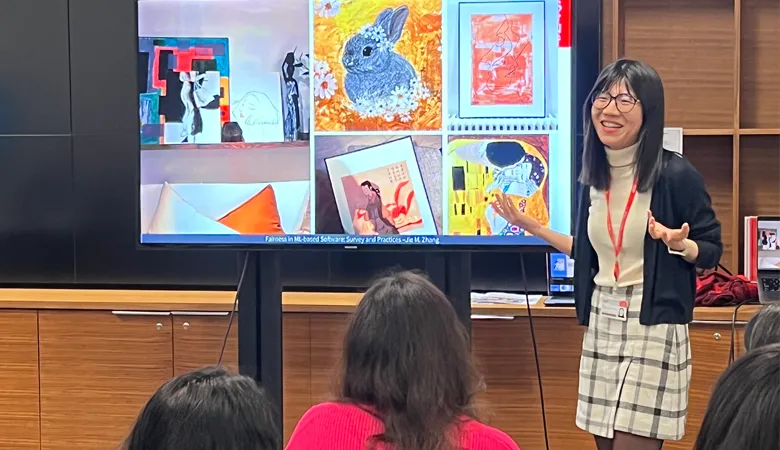
Fairness in ML-based Software: Survey and Practices was an exploration by Jie Zhang of the often prejudiced nature of machine learning-based (ML) software. It’s main concern was how to instill fairness in a technology which is now used in everything from selecting job applicants to predicting medical treatment.
An ML model is fair if it treats privileged and underprivileged groups equally, but as Jie outlined, this often isn’t the reality. AI recruitment tools often favour male candidates and large language models like ChatGPT have been recorded to contain damaging gender stereotypes in their answers.
By using surveys to look at widely used ML models and data libraries, databases used by ML software, Jie defined a number of novel methods to mitigate bias and improve fairness in applications such as machine translation systems and chatbots.
Sara Tandon's presentation, Visual Task Performance and Spatial Abilities: An Investigation of Artists and Mathematicians, explored how artists and mathematicians interacted with data visualisation. Historically intertwined, the arts and mathematics have often shared a joint history, being divorced and specialised only within recent centuries.
The result of this has been that while artists may often feel like they struggle to interact with numbers-based assignments, in reality, they often excel at statistical data visualisation tasks like interpreting and creating charts and graphs. This is most likely due to their daily practice of visual manipulation in their design work and their high spatial visualisation capabilities.
By charting mathematicians' general preference for text based statistics interpretation over artists, despite artists’ proficiency at data visualisation, the study has ramifications for mathematics education. By embracing information visualisation in the classroom, groups who have traditionally been seen to be more ‘creative’, such as women, may be able to approach learning with less anxiety.
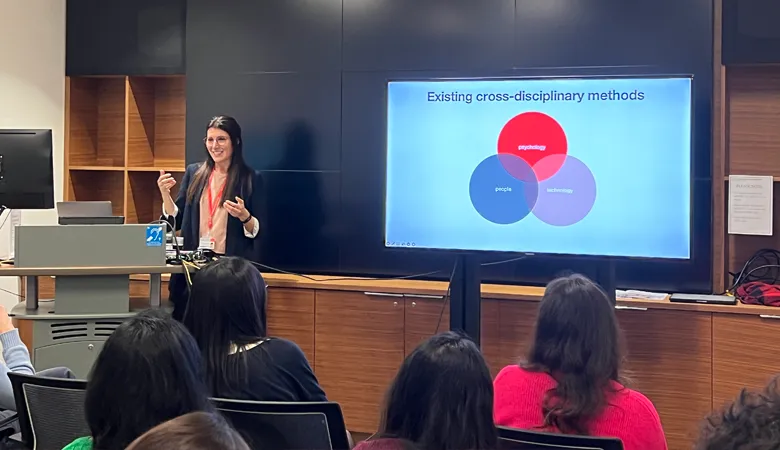
Moving from teaching to parenting, the last talk of the night was Seray Ibrahim’s presentation on Investigating and designing for in-situ parenting support with technology. Parenting is one of the strongest predictors of child well-being, but research has shown that parents find it difficult to implement behavioural and emotion-focused parenting strategies within the context of their daily lives. Ultimately, little is really known about what aspects of ‘evidence-based’ advice parents do and don’t use, or how technology might be designed to support interactions between parents and children.
Outlining a series of probes, exploratory data collection instruments which help researchers understand more about everyday parenting experience, Seray’s teams’ research supported parents to reflect on their own parenting strategies. The research also suggested a potential framework for introducing evidence-based parenting strategies to parents in the moments where they are struggling. It’s hoped that this can be used to design new support methods to help parents and their children.
Reflecting on the event on behalf of the wider Women in Informatics group (Alfie Abdul-Rahman, Yiwen Xing and Carlota Vazquez Gonzalez), Hana Kopecka commented:
The aim of this conference was to create a space to meet other women in informatics, celebrate their great work and inspire each other; we think that we’ve successfully achieved that. We believe it’s important to create such events to remind ourselves of the community of the inspiring women that we are part of, as the field is so heavily male-dominated, and some women might struggle to feel like part of the community. Our hope for the future of this event and others like it is that they will no longer be necessary due to the equal representation of women in the field.
Hana Kopecka, PhD Student in Human-AI interaction, Department of Informatics
Following the round of talks, the audience gathered to discuss the implications of each of the research papers presented and network over refreshment. Bringing together students, staff and spectators from across the spectrum of science and humanities, the conference ended on a strong note of community building where it can be expected the next generation of presenters to emerge.
The next Women in Informatics event will be to celebrate the end of the exam period, held in on 31 May 2023 16:00 – 19:00. To learn more about how to get involved with promoting equality in STEMM and the Women in Science at Informatics group, contact Dr Alfie Abdul-Rahman at alfie.abdulrahman@kcl.ac.uk.

